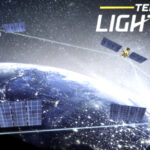
Vocus and Telesat (Nasdaq and TSX: TSAT) have announced that Vocus will build Australia’s first Telesat Lightspeed Low Earth Orbit (LEO) Landing Station.

Vocus will construct and operate the new Landing Station in New South Wales, Australia, and provide fiber connectivity to Telesat’s point of presence (PoP), connecting Telesat’s advanced LEO Lightspeed satellite constellation to terrestrial networks, providing secure, low-latency satellite services across the region.
The long-term agreement also includes Telesat Lightspeed services when the network becomes operational. These services, backed by committed information rates (CIR) and comprehensive service level agreements, will ensure resilient, low-latency connectivity for Vocus’ enterprise and government customers, complementing its already substantial LEO satellite services customer base.
A unique feature of the Telesat Lightspeed service will be its Terminal-to-Terminal direct connectivity capability, which eliminates the need for terrestrial links for customers transmitting especially sensitive information.
As a leading provider of Landing Stations and fibre network solutions, Vocus is an ideal partner to deliver the resilient, scalable terrestrial infrastructure that not only serves as a key interconnect point for customer data, but also further strengthens Australia’s digital infrastructure resilience,” said Asit Tandon, Telesat’s Chief Network and Information Officer. “Telesat will begin launching its LEO satellites in late 2026 and this new Landing Station will play a key role in satellite testing and customer field trials before global service delivery.”
We’re proud to be partnering with Telesat on establishing its network in Australia,” said Ashley Neale, Head of Vocus Space and Wireless Operations. “Vocus already has 30 ground stations currently in operation or contracted to be built, demonstrating that our infrastructure provides the critical reliability needed for LEO networks. “This will enable, for example, a naval vessel to communicate via the Telesat Lightspeed satellites directly with ground deployed soldiers via the optical laser-linked space network, completely bypassing land-based infrastructure or the public internet. This capability will be extremely valuable to customers with mission-critical communications requirements and a desire to preserve data sovereignty even outside of Australia’s geographic borders.”
Glenn Katz, Telesat’s Chief Commercial Officer, said, “In addition to public networking options via Telesat’s global Landing Stations, our flexible architecture includes options for Private Access Stations, special security add-ons, and the ability for Vocus’ customers to maintain complete control over encryption, providing valuable, differentiated capabilities in their LEO portfolio.”

